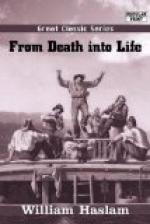He was in sore distress, which increased all the more as he gave vent to his feelings. I could not help rejoicing, and told him that God had wounded him, but that He only wounds to heal, and kills to make alive.
“Ah,” he said, “that is the first thought of comfort I have had; it is like balm to my soul.”
We knelt down and prayed; then I had the privilege of leading him to Christ, and we praised God together.
I gave him some breakfast, and after that rode back with him to see his wife, whom he had left in the morning in great trouble of mind. We found her up, and rejoicing. It was most touching to witness the mutual surprise and joy of these two loving ones, when they discovered that they were now united in the Lord.
She told us, that after her husband’s departure she was in such terrible trouble that she got up to pray, and that while she was on her knees she saw a vision on the bed-cover. Before her was printed, in large visible letters, “Thy sins be forgiven thee;” she could scarcely believe her eyes, but with her own finger she traced the letters, and was sure they were there. Taking them as a message from Christ, she rose and thanked Him, and now felt quite sure she was saved. I could not help telling her not to believe in her eyes or her visions, but in Jesus, and the fact that He had died for her. Having thanked God together, they next began to think of their servants; so we sent for them, and both master and mistress told them what the Lord had done for their souls; and while we were praying, they all three cried aloud for mercy, and found peace.
This was the commencement of a good work in that town by drawing-room meetings, and many were gathered to the Lord. Amongst the number was the mayor of the town, who in his turn wished to have a meeting at his house. As soon as I was able to fix the day, he invited his friends, but on finding that so many more desired to come than he could accommodate, he announced that the meeting would be held at the Town Hall. Great interest was excited, and it was soon evident that even this building would not be large enough, so it ended in the Temperance Hall being selected. The vicar hearing about it, wrote to protest, and asked me to call on him before I went to the place of meeting. He said it was bad enough for me to come to his parish to private houses, but to come to a public room, and that a large one, was quite out of the question.
I endeavoured to show him that the lecture or address I had come to give was not an official or ministerial act; but he would not see that. I also suggested that there was no law against it. He, begging my pardon, said “The ‘Conventicle Act’ had not been repealed yet, and that no one could lawfully hold a meeting of more than twenty persons.”
“But surely,” I replied, “that is virtually repealed by the ’Toleration Act.’ A clergyman ought not to be in greater bondage in England than a layman, or more restricted. Anybody else can come and preach the Gospel in your parish, and you cannot hinder it. Do not hinder me. It will do you no harm.”




